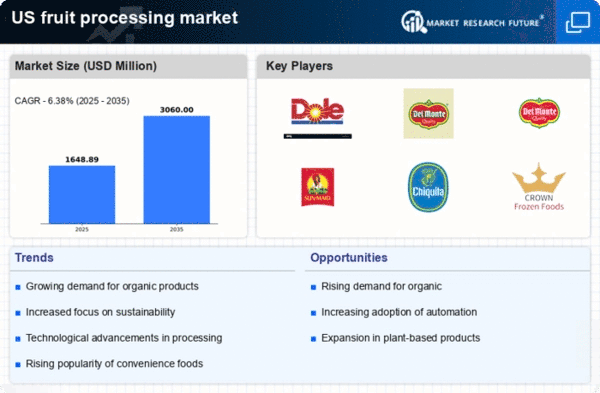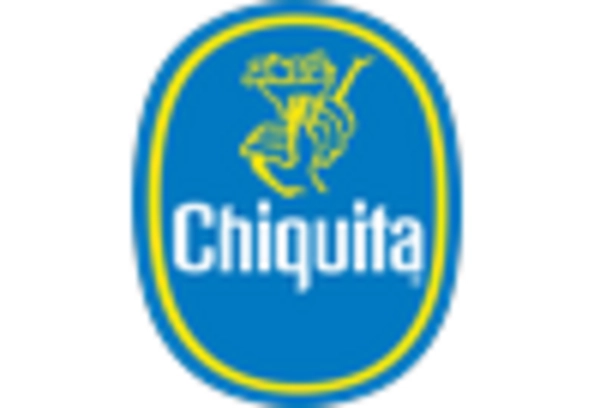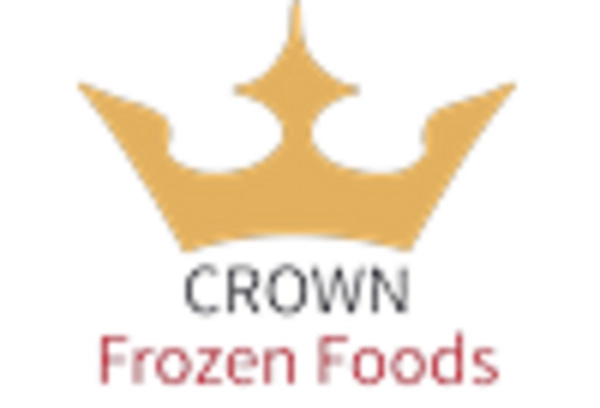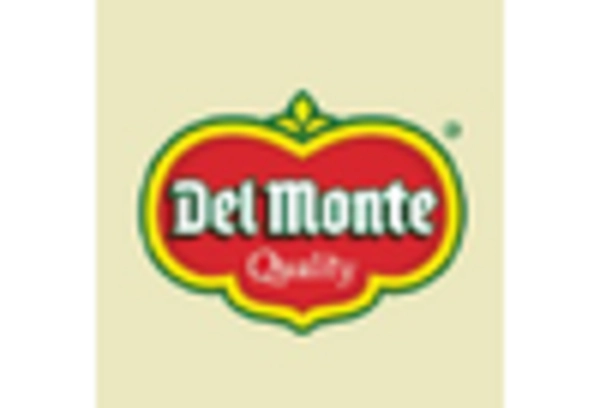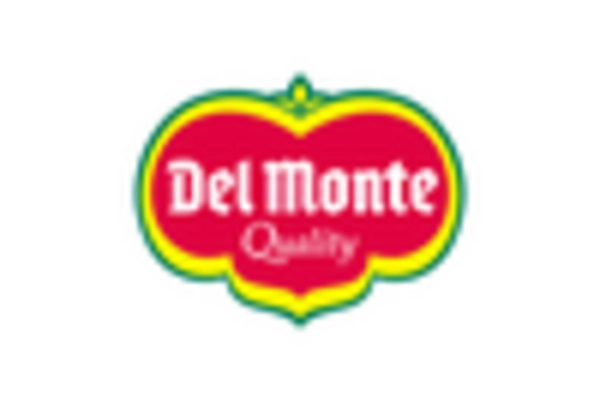Expansion of E-commerce Channels
The fruit processing market is undergoing a transformation with the rapid expansion of e-commerce channels. As online shopping becomes increasingly prevalent, consumers are turning to digital platforms for their grocery needs, including processed fruit products. This trend is supported by data showing that online grocery sales in the US are expected to reach $100 billion by 2025, representing a substantial growth opportunity for the fruit processing market. E-commerce allows for greater accessibility and convenience, enabling consumers to purchase a wide variety of fruit products from the comfort of their homes. In response, manufacturers are investing in online marketing strategies and partnerships with e-commerce platforms to enhance their visibility and reach. This shift not only alters the distribution landscape but also compels the fruit processing market to adapt to changing consumer preferences and shopping behaviors.
Innovations in Packaging Technology
Innovations in packaging technology are playing a crucial role in shaping the fruit processing market. As consumers become more environmentally conscious, there is a growing demand for sustainable packaging solutions that minimize waste and reduce environmental impact. Recent advancements in biodegradable and recyclable materials are gaining traction, with market data suggesting that the sustainable packaging segment is projected to grow by 7% annually. This trend encourages manufacturers in the fruit processing market to explore eco-friendly packaging options that align with consumer values. Additionally, smart packaging technologies, such as modified atmosphere packaging, are being adopted to extend shelf life and maintain product quality. These innovations not only enhance the consumer experience but also contribute to the overall sustainability goals of the fruit processing market.
Rising Demand for Convenience Foods
The fruit processing market experiences a notable surge in demand for convenience foods, driven by busy lifestyles and the need for quick meal solutions. Consumers increasingly seek ready-to-eat fruit products, such as pre-cut fruits and fruit snacks, which are perceived as healthy alternatives to traditional snacks. This trend is reflected in market data, indicating that the convenience food segment is projected to grow at a CAGR of approximately 5.5% over the next five years. As a result, manufacturers in the fruit processing market are adapting their product lines to meet this demand, focusing on innovative packaging and preservation techniques to enhance shelf life and maintain freshness. The shift towards convenience foods not only influences consumer purchasing behavior but also compels producers to streamline their processing methods, thereby impacting the overall dynamics of the fruit processing market.
Increased Focus on Nutritional Value
The fruit processing market is significantly influenced by the growing emphasis on nutritional value among consumers. As awareness of health and wellness continues to rise, individuals are increasingly scrutinizing the nutritional content of processed foods. This shift is prompting manufacturers to enhance the nutritional profiles of their fruit products, incorporating functional ingredients and fortifying them with vitamins and minerals. Market Research Future indicates that products labeled as 'high in vitamins' or 'rich in antioxidants' are witnessing a sales increase of around 8% annually. Consequently, the fruit processing market is evolving to prioritize health benefits, leading to the development of innovative products that cater to health-conscious consumers. This focus on nutritional value not only shapes product development strategies but also influences marketing approaches within the fruit processing market.
Regulatory Compliance and Food Safety Standards
The fruit processing market is significantly impacted by stringent regulatory compliance and food safety standards. As consumers become more aware of food safety issues, regulatory bodies are enforcing stricter guidelines to ensure the safety and quality of processed food products. This has led to increased scrutiny of production processes and ingredient sourcing within the fruit processing market. Companies are investing in quality control measures and certifications to meet these regulations, which can be costly but necessary for maintaining consumer trust. Market data indicates that compliance costs can account for up to 15% of total production expenses for some manufacturers. Consequently, the emphasis on regulatory compliance not only shapes operational practices but also influences the competitive landscape of the fruit processing market, as companies strive to differentiate themselves through quality assurance.


